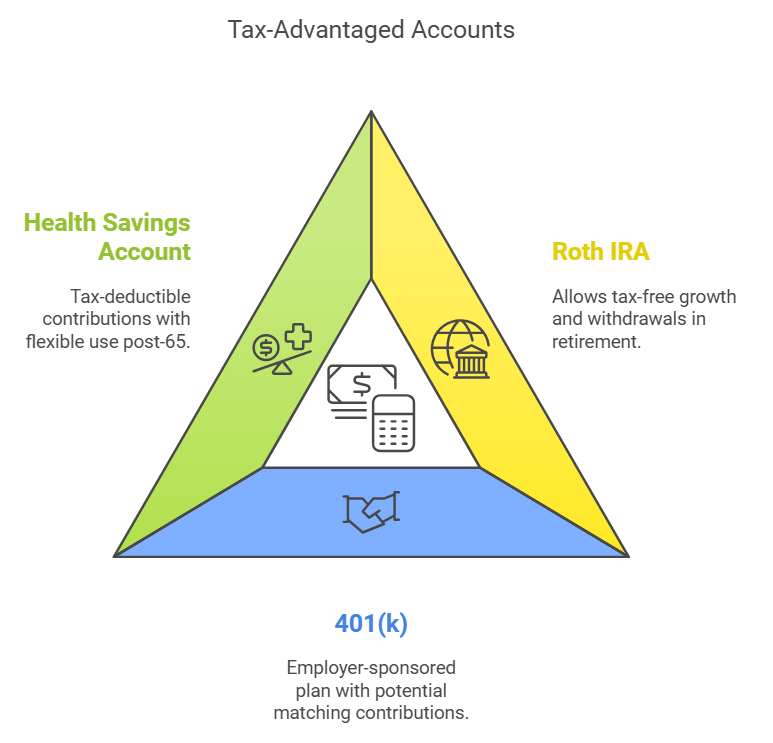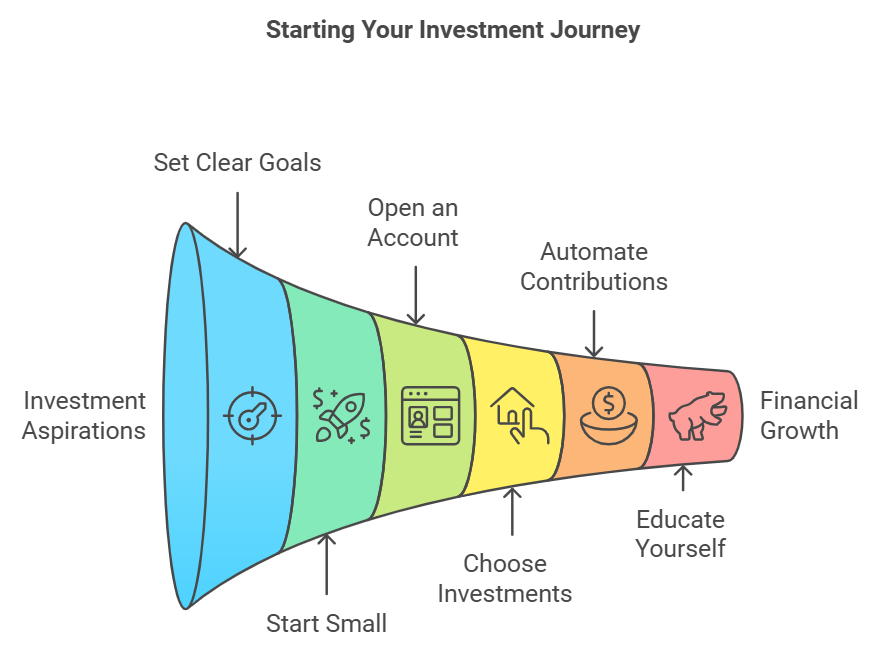Investing early isn’t just a financial buzzword; it’s one of the smartest moves you can make for your future. Picture this: two friends, Alex and Jamie, both want to retire comfortably.
Alex starts investing at 20, while Jamie waits until they’re 30. By the time they reach retirement age, Alex’s portfolio could be double — or even triple — Jamie’s, all because they had more time to let their money grow.
Starting your investment journey early serves as a springboard toward building wealth, leveraging time, and weathering market ups and downs. But it’s not just about dollars and cents; it’s about creating opportunities and achieving financial independence.
Whether you’re fresh out of college or just starting to think about your future, the earlier you begin, the more options you’ll have later.
Today, we’ll break down why time is your biggest ally when it comes to investing, the power of compound interest, and actionable steps to help you start today — even if you think you don’t have “enough money” to invest. Let’s dive in.
Contents
The Power of Compound Interest

It’s widely believed that Albert Einstein called compound interest the “eighth wonder of the world,” and it’s easy to see why. Compound interest is the secret sauce that can turn even modest investments into significant wealth over time.
The earlier you start investing, the more you can take advantage of this powerful financial principle.
Here’s how it works: when you invest money, it earns returns. Those returns are then reinvested, allowing you to earn higher returns on both your initial investment and the earnings it generates. Over time, this snowball effect creates exponential growth.
For example, imagine you invest $5,000 annually starting at age 20, with an average return of 7%. By the time you’re 60, your investment will have grown to over $1 million.
But if you wait until age 30 to start, you’d only have about half that amount — around $505,000 — even if you contribute the same amount each year. That 10-year head start makes an enormous difference.
Time Is Your Biggest Ally

In investing, time is more than just a number on the clock — it’s your greatest advantage. The stock market, while unpredictable in the short term, tends to trend upward over the long run. By starting early, you give your investments time to grow and recover from inevitable market dips.
Think of investing as planting a tree. The longer it has to grow, the deeper its roots and the taller its branches. Similarly, the earlier you invest, the more time you have to weather storms, benefit from rebounds, and enjoy the fruits of consistent growth.
For example, consider the S&P 500’s historical performance. Despite downturns like the 2008 financial crisis, the average annual return has been about 7-10% over the past several decades. Starting early allows you to ride out the bad years and maximize capital gains during the good ones.
It can even give you the ability to consider the financial health of your children, potentially putting something aside for them in a trust fund or another account.
Building Good Financial Habits
Starting your investment journey early isn’t just about growing wealth — it’s about cultivating habits that will serve you for a lifetime. When you begin investing young, you naturally develop the discipline to start saving, budgeting, and planning for the future.
One of the biggest benefits of early investing is automation. By setting up automatic contributions to a 401(k), IRA, or brokerage account, you make saving and investing second nature.
For young investors, technology can be a game-changer. Apps like Acorns, Robinhood, and Stash make it simple to start with small amounts and track your progress. These tools also help demystify investing, making it feel more accessible and less intimidating.
Over time, these good habits can have a ripple effect. Young investors are more likely to stick to a budget, manage debt wisely, and make thoughtful financial decisions. And when you begin to see your money grow, it reinforces the mindset shift from immediate gratification to long-term wealth-building.
Taking Advantage of Tax-Advantaged Accounts

One of the smartest ways to build wealth early is by leveraging tax-advantaged accounts like Roth IRAs, 401(k)s, and HSAs. These accounts help you grow your money and save on taxes, maximizing the value of every dollar you invest.
- Roth IRA: Contributions to a Roth IRA are made with after-tax dollars, but the growth and withdrawals in retirement are tax-free. Starting early allows you to build a sizable tax-free nest egg, especially if you’re currently in a lower tax bracket.
- 401(k): If your employer offers a 401(k) plan, take full advantage of it — especially if there’s a matching contribution. For instance, if your employer matches 3% of your salary, that’s free money toward your retirement. Over the decades, these contributions will grow substantially.
- Health Savings Account (HSA): Often overlooked, an HSA can be a powerful investment tool. Contributions are tax-deductible, and qualified withdrawals for medical expenses are tax-free. Plus, after age 65, you can use HSA funds for any purpose without penalty.
Starting early allows you to harness the compounding potential of these accounts fully. It also ensures you won’t miss out on annual contribution limits, which can’t be retroactively applied.
For example, maxing out a Roth IRA at $6,500 per year starting at age 20 can result in over $1 million by retirement (assuming a 7% return). Delaying by even 10 years means contributing more money but ending up with significantly less wealth.
Flexibility and Financial Freedom
When you start investing young, you create a financial cushion that opens doors to opportunities and helps you navigate life’s uncertainties with confidence.
One of the biggest benefits of early investing is flexibility. Over time, your growing investments can serve as a safety net during unexpected challenges, such as job loss or medical emergencies.
Instead of relying on credit cards or loans, you can draw on your investments, allowing you to stay afloat without accumulating debt.
Additionally, starting early paves the way for financial independence. Whether your dream is to retire early, travel the world, or start your own business, having a robust portfolio gives you the freedom to pursue your passions without being tethered to a paycheck.
For example, consider the concept of Coast FI (Financial Independence): if you save and invest aggressively in your 20s and 30s, your portfolio could grow large enough to sustain a comfortable retirement by itself — meaning you only need to cover your current living expenses with your income.
The earlier you invest, the sooner you can shift your focus from surviving to thriving. Financial freedom isn’t just about having money; it’s about having choices, and starting your investment journey early makes those choices possible.
Actionable Steps to Start Today

Getting started with investing can feel intimidating, but it doesn’t have to be. Here are practical steps to help you begin your investment journey today:
- Set Clear Goals: Define what you’re investing for — retirement, a down payment on a house, or financial independence. Clear financial goals help you choose the right investment strategy and timeline.
- Start Small: Don’t wait until you have a large sum of money. Many platforms allow you to start investing with just a few dollars. The important part is to start, even if it’s small.
- Open an Account: Choose the right bank account for your financial goals:
- Retirement-focused: Consider a Roth IRA or 401(k).
- General investing: Look into brokerage accounts.
- Beginner-friendly options: Robo-advisors like Betterment make investing simple.
- Choose Your Investments: For beginners, low-cost index mutual funds or ETFs are great investment options. They offer diversification and track the market’s overall performance. Avoid putting all your money into stocks until you’re more experienced.
- Set Up Automatic Contributions: Automating your investments ensures consistency and removes the temptation to skip contributions. Schedule regular transfers to your investment accounts — this is a game-changer.
- Educate Yourself: Take time to learn about investing basics. Many platforms, like Vanguard or Fidelity, offer free educational resources. Podcasts, books, online courses, and blogs like Money Saving Parent can also help build your confidence.
- Review and Adjust: Check your portfolio periodically to ensure it aligns with your goals. Rebalance if needed and adjust contributions as your income grows.
Frequently Asked Questions
You don’t need a lot to begin investing. Many platforms allow you to start with as little as $5 or $10. The key is to start small and build consistency over time. As your income grows, you can increase your contributions.
For most beginners, low-cost index funds or ETFs are a safe and straightforward investment option. They offer diversification and track the overall market, reducing the risk associated with individual stocks.
It depends on the type of debt. High-interest debt, like credit cards, should be a priority. However, if you have low-interest debt, such as a student loan, you can invest and pay down debt simultaneously.
Conclusion: Start Today, Thank Yourself Tomorrow
Investing early is one of the smartest financial decisions you can make. By harnessing the power of compounding interest, leveraging time, and building good habits, you set yourself up to achieve financial freedom and a future filled with opportunities.
Remember, it’s not about how much you start with — it’s about starting at all.
The sooner you take action, the more time your money has to grow and the closer you’ll be to achieving your goals. Don’t wait for the “perfect moment”; there’s no better time to start than today.
Ready to take the next step?
Check out Money Saving Parent for more practical tips, in-depth guides, and actionable advice to help you on your financial journey.



